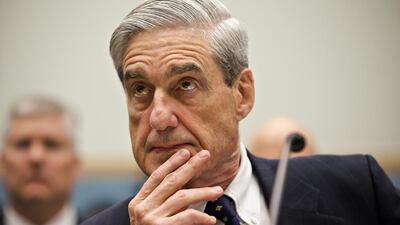WASHINGTON // The Justice Department abruptly appointed former FBI director Robert Mueller on Wednesday night as a special counsel to lead a federal investigation into allegations that Donald Trump’s campaign collaborated with Russia to sway the 2016 election that put him in the White House. Mr Mueller will have sweeping powers and the authority to prosecute any crimes he uncovers.
The surprise announcement to hand the probe over to Mr Mueller, a lawman with deep bipartisan respect, was a striking shift for Mr Trump’s Justice Department, which had resisted increasingly loud calls from Democrats for an outside prosecutor. It immediately escalated the legal stakes - and the potential political damage - for a president who has tried to dismiss the matter as partisan witch hunt and a “hoax”.
The announcement, the latest in the shock-a-day Washington saga, was made by deputy attorney general Rod Rosenstein. The White House counsel’s office was alerted only after the order appointing Mr Mueller was signed, said a senior White House official.
In a written statement, Mr Trump insisted anew there were no nefarious ties between his campaign and Russia.
“A thorough investigation will confirm what we already know – there was no collusion between my campaign and any foreign entity,” he declared. “I look forward to this matter concluding quickly.”
Mr Mueller’s broad mandate gives him not only oversight of the Russia probe, but also “any matters that arose or may arise directly from the investigation.” That would surely include Mr Trump’s firing last week of FBI director James Comey.
Mr Mueller, a former federal prosecutor at the Justice Department, was confirmed as FBI director days before the September 11, 2001, attacks that would ultimately shape his tenure. The FBI’s counterterror mission was elevated in those years, as the US intelligence agencies adjusted to better position America to prevent another attack of such magnitude. He was so valued that president Barack Obama asked him to stay on two years longer than his 10-year term.
Mr Comey succeeded him, appointed by Mr Obama.
Republicans have largely stood behind Mr Trump in the first months of his presidency as FBI and congressional investigations into Russia’s election meddling intensified. But GOP lawmakers have grown increasingly anxious since Mr Trump fired Comey, who had been leading the bureau’s probe – and after Mr Comey associates said he had notes from a meeting in which Mr Trump asked him to shut down the investigation into the Russia ties of former National Security adviser Michael Flynn.
First reactions from Congress were mainly positive.
House speaker Paul Ryan said the appointment was consistent with his goal of ensuring that “thorough and independent investigations are allowed to follow the facts wherever they may lead.”
Republican Jason Chaffetz of Utah, chairman of the House Oversight Committee, said Mr Mueller was a “great selection. Impeccable credentials. Should be widely accepted.”
The latest political storm, coupled with the still-potent fallout from Mr Trump’s recent disclosure of classified information to Russian diplomats at the White House, has overshadowed all else in the capital and beyond. Stocks fell sharply on Wall Street on Wednesday as investors worried the latest turmoil in Washington could hinder Mr Trump’s pro-business agenda
Mr Trump has repeatedly slammed the FBI and congressional investigations as a “hoax” and blamed disgruntled officials at intelligence agencies for leaking information related to the probes. During a commencement address on Wednesday at the Coast Guard Academy, he complained bitterly about criticism he’s faced.
“No politician in history, and I say this with great surety, has been treated worse or more unfairly,” he said. “You can’t let the critics and the naysayers get in the way of your dreams. ... I guess that’s why we won. Adversity makes you stronger. Don’t give in, don’t back down. ... And the more righteous your fight, the more opposition that you will face.”
No less a commentator than Russia's Vladimir Putin called the dramatic charges swirling around Mr Trump evidence of "political schizophrenia spreading in the US". He offered to furnish a "record" of the Trump-diplomats meeting in the Oval Office if the White House desired it.
There was no word on what that record might entail, a question many were likely to raise in light of Mr Trump’s recent warning to Mr Comey that he had “better hope” there were no tapes of a discussion they’d had.
* Associated Press

